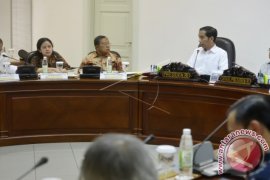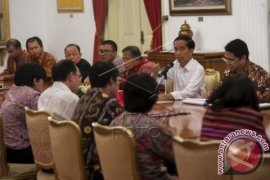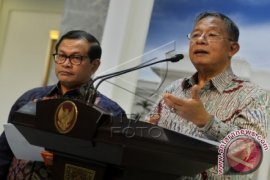Jakarta (Antara Bali) - All economic policy packages of the government, including the fourth tranche issued on Thursday, aim to improve Indonesia's economic conditions, stated Vice President Jusuf Kalla.
"Regulations outlined in the economic policy packages aim to help the economy develop in a better, easier, and cost-effective manner, so that it will become more efficient," the vice president remarked while giving a public lecture at the Economic Faculty of the Trisakti University here on Thursday.
During the lecture, Kalla reminded that the "trisakti" concept means economic independence, and thus, Indonesia will strive to achieve it.
"Independence means not relying on others as we have the strength, responsibility, and dignity to achieve it by using our own capability," he remarked.
"Just wait for it this evening," Kalla said when questioned about the details of the fourth tranche of the government's economic policy packages.
Earlier, Chief Economic Minister Darmin Nasution had stated that the fourth phase of the government's economic policy packages would primarily focus on the efforts to overcome problems in the manpower sector.
"The fourth tranche will mostly deal with the manpower problem, employment, the formulation of minimum wages, and manpower licenses. It will be related to several licenses," Nasution said on Tuesday.
The chief economic minister did not elaborate on the government's plan to issue the fourth tranche of the economic policy packages, which is expected to be announced on Thursday evening, Oct. 15.
However, it is certain that there will be a streamlining of bureaucratic licensing procedures to offer convenience to workers.
In order to overcome the manpower problem, the chief economic minister explained that the fourth phase of the policy packages would also include details regarding additional regulations, which will facilitate the extension of micro loans for small businesses, known as KUR credits.
The Indonesian Chamber of Commerce and Industry (Kadin) believes that the economic policy packages issued by President Joko Widodo show their pro-small business tendency since there are matters relating to problems often faced by small businesses.
"Small businesses will be benefited by the lowering of the interest rate of KUR credits from 22 percent to 12 percent," Kadin Deputy Chairman for Banking and Financial Affairs Rosan Perkasa Roeslani remarked.
Roeslani shed light on the absorption of KUR credits, which was still very slow. Therefore, the government should now encourage the acceleration of KUR credit extension.
He said the Kadin was awaiting a follow-up policy, which is expected to restore the confidence of investors, people, and other businesspersons.
Roeslani stated that the government could regain the trust if its policy is right on target after several businesses were closed down, and workers were laid off. (WDY)





